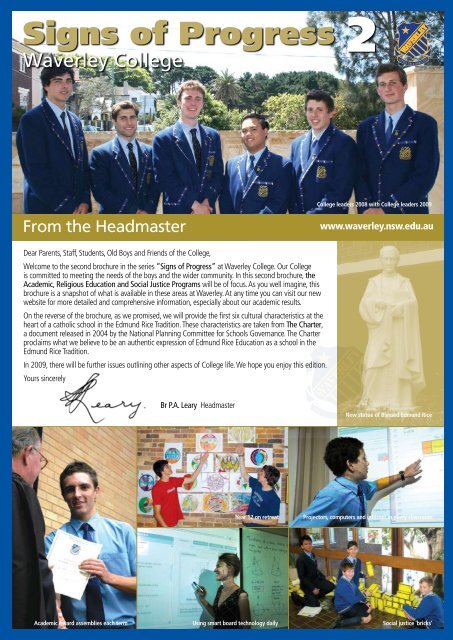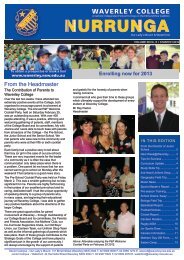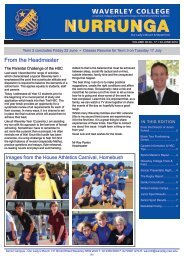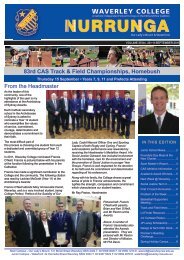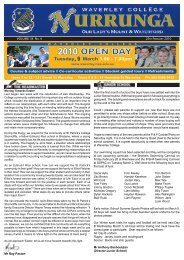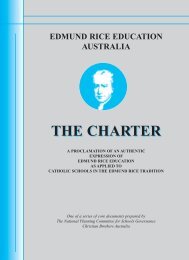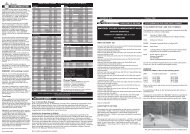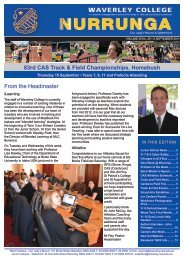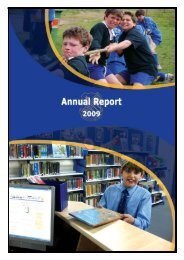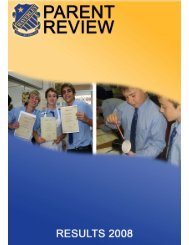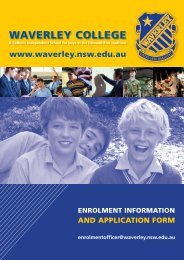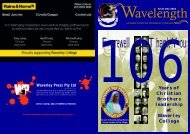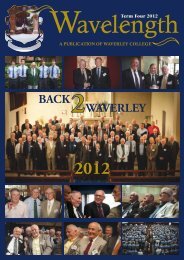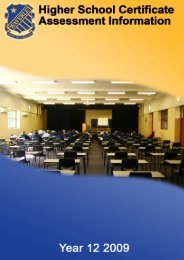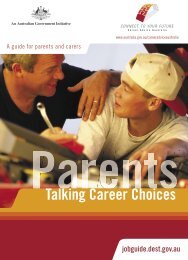Signs of Progress II - Waverley College
Signs of Progress II - Waverley College
Signs of Progress II - Waverley College
Create successful ePaper yourself
Turn your PDF publications into a flip-book with our unique Google optimized e-Paper software.
<strong>Signs</strong> <strong>of</strong> <strong>Progress</strong> 2<br />
<strong>Waverley</strong> <strong>College</strong><br />
<strong>College</strong> leaders 2008 with <strong>College</strong> leaders 2009<br />
From the Headmaster<br />
www.waverley.nsw.edu.au<br />
Dear Parents, Staff, Students, Old Boys and Friends <strong>of</strong> the <strong>College</strong>,<br />
Welcome to the second brochure in the series “<strong>Signs</strong> <strong>of</strong> <strong>Progress</strong>” at <strong>Waverley</strong> <strong>College</strong>. Our <strong>College</strong><br />
is committed to meeting the needs <strong>of</strong> the boys and the wider community. In this second brochure, the<br />
Academic, Religious Education and Social Justice Programs will be <strong>of</strong> focus. As you well imagine, this<br />
brochure is a snapshot <strong>of</strong> what is available in these areas at <strong>Waverley</strong>. At any time you can visit our new<br />
website for more detailed and comprehensive information, especially about our academic results.<br />
On the reverse <strong>of</strong> the brochure, as we promised, we will provide the first six cultural characteristics at the<br />
heart <strong>of</strong> a catholic school in the Edmund Rice Tradition. These characteristics are taken from The Charter,<br />
a document released in 2004 by the National Planning Committee for Schools Governance. The Charter<br />
proclaims what we believe to be an authentic expression <strong>of</strong> Edmund Rice Education as a school in the<br />
Edmund Rice Tradition.<br />
In 2009, there will be further issues outlining other aspects <strong>of</strong> <strong>College</strong> life. We hope you enjoy this edition.<br />
Yours sincerely<br />
Br P.A. Leary Headmaster<br />
New statue <strong>of</strong> Blessed Edmund Rice<br />
Year 12 on retreat<br />
Projectors, computers and internet in every classroom<br />
Academic Award assemblies each term<br />
Using smart board technology daily<br />
Social justice ‘bricks’
december 2008 update<br />
Part 2: Academic, Religious<br />
<strong>Waverley</strong> <strong>College</strong> students took part in the following state<br />
wide Assessments, Tests, Examinations and Competitions in<br />
recent times:<br />
Basic Skills Test – Year 5<br />
Year 5 students undertook the Basic Skills Test conducted in 2007 across NSW.<br />
Student’s performance is reported in Bands. Band 6 indicating the highest level <strong>of</strong><br />
achievement. 95% <strong>of</strong> <strong>Waverley</strong> Students Overall Literacy was Band 4 or better in<br />
comparison to 81% <strong>of</strong> the State. In Overall Numeracy 96% <strong>of</strong> <strong>Waverley</strong> students<br />
achieved at least a Band 4 performance in comparison to 79% <strong>of</strong> the State.<br />
English Language & Literacy Assessment – Years 7 & 8<br />
This test, for all Year 7 and 8 students in NSW, assesses students in the three<br />
categories <strong>of</strong> Writing, Reading and Language skills and reports their individual<br />
performance in four Levels <strong>of</strong> Achievement: High, Pr<strong>of</strong>icient, Elementary and Low.<br />
For <strong>Waverley</strong> the results indicate 95 – 97% <strong>of</strong> students perform in the highest<br />
two categories for Overall Literacy. Very few <strong>Waverley</strong> students perform at the<br />
Elementary and Low categories.<br />
Secondary Numeracy Assessment Program<br />
Years 7 & 8<br />
This test for all Year 7 and 8 students in NSW assesses students<br />
in the six Mathematical components <strong>of</strong> Number, Problem Solving,<br />
Numeracy, Space, Data and Measurement. In every category<br />
Year 7 Students scored above the state performance in the<br />
High and Pr<strong>of</strong>icient levels <strong>of</strong> achievement and significantly below<br />
the state performance in Elementary and Low levels. In every<br />
category Year 8 Students scored significantly above the state<br />
in the High level <strong>of</strong> achievement and significantly below the state<br />
performance in Elementary and Low levels <strong>of</strong> achievement.<br />
School Certificate Examinations for Year 10<br />
In English, Mathematics, Science, History and Geography the<br />
percentage <strong>of</strong> students achieving a mark <strong>of</strong> 70 or better were<br />
between 5% and 19 % above the State. In the Computing Skills<br />
test 95.47% <strong>of</strong> <strong>Waverley</strong> students where graded as either Highly<br />
Competent or Competent, the two highest grades out <strong>of</strong> four.<br />
Higher School Certificate for Year 12<br />
We know that at least fifteen who have achieved UAI results above 90 and another thirty students achieved UAI’s above 80. Using the available data we<br />
would calculate that, in percentage terms, around 50% <strong>of</strong> <strong>Waverley</strong> students who applied for a UAI were placed in the top 20% <strong>of</strong> the State. Over 90%<br />
<strong>of</strong> the <strong>College</strong>’s students applying for university were <strong>of</strong>fered places. One <strong>of</strong> the most pleasing aspects <strong>of</strong> the results was the performance <strong>of</strong> the ‘average’<br />
students at <strong>Waverley</strong>. Approximately 70% <strong>of</strong> HSC Marks were above 70 (Bands 4, 5 or 6). Considering <strong>Waverley</strong> does not exclude students on the basis <strong>of</strong><br />
academic ability, these results would indicate <strong>Waverley</strong> students continue to perform very well against the rest <strong>of</strong> the state.<br />
Subjects with outstanding percentages <strong>of</strong> students receiving Band 6 Results<br />
Ancient History 20% in Band 6 Economics 10% in Band 6 English Extension I 19% in Band 6<br />
Geography 20% in Band 6 German Continuers 20% in Band 6 S<strong>of</strong>tware Design 10% in Band 6<br />
Subjects with outstanding percentages <strong>of</strong> students receiving Band 5 Results<br />
Ancient History 55%<br />
Chemistry 42%<br />
Engineering Studies 40%<br />
English Extension I 81%<br />
German Beginners 50%<br />
German Extension 43%<br />
History Extension 50%<br />
Legal Studies 45%<br />
Mathematics Ext 1 60%<br />
Mathematics Ext <strong>II</strong> 67%<br />
Music 2 50%<br />
Music Extension 100%<br />
Modern History 45%<br />
Senior Science 36%<br />
Visual Art 56%<br />
This graph showing the changes in<br />
HSC Bands from 2001 to 2007.<br />
% 40<br />
35<br />
30<br />
25<br />
20<br />
15<br />
10<br />
5<br />
0<br />
Percentages <strong>of</strong> Bands 2001–2007 HSC<br />
2001 2002 2003 2004 2005 2006 2007<br />
Year<br />
Band 6<br />
Band 5<br />
Band 4<br />
Band 3<br />
Band 2<br />
Band 1<br />
A number <strong>of</strong> State and National Competitions in English, Mathematics, Science, Geography, Visual Arts, Computer Studies and Critical Thinking.
Education and Social Justice<br />
Study Skills Program <strong>Waverley</strong> <strong>College</strong><br />
2008/2009<br />
In 2008 <strong>Waverley</strong> <strong>College</strong> engaged the services <strong>of</strong> an external consultant to<br />
conduct Study Skills Seminars for all boys in Year 7 – 12. The objective <strong>of</strong> the<br />
Seminars was to assist the boys with planning their study time, managing<br />
their workload and practical strategies on how to study. Each session is<br />
designed to help students understand the way they study and will provide<br />
them with practical skills they can use to help maximize their results.<br />
Year 9 and 10 – Student Seminars<br />
(held in groups <strong>of</strong> 80 students)<br />
This Seminar Title was ‘Improving Your Results’<br />
The main areas covered:<br />
• Organising your papers and your time (scheduling and prioritising).<br />
• Using a diary effectively to manage workload.<br />
• Making study notes that work (including mind maps, linear note-taking).<br />
• Year 10: Preparing for the School Certificate exams.<br />
Year 7 and 8 – Parent Student Seminar<br />
This Seminar Title was “Tools for High School Success”<br />
The main areas covered:<br />
• Managing homework and assignement effectively by efficient time<br />
management.<br />
• Learning to be more organised for school and making study notes.<br />
• Working and studying in high school.<br />
Year 11 – Parent / Student Seminar<br />
This Seminar Title is ‘Welcome to the HSC Starting Line’<br />
The main areas covered:<br />
• Using class time<br />
• Getting organised<br />
• Managing the Workload • Making Study notes<br />
• Studying for assessments • Helping your brain
Religious Education at <strong>Waverley</strong> <strong>College</strong><br />
Curriculum<br />
• Every student in Years 11 and 12 has a copy <strong>of</strong> Living Religion (3rd ed.)<br />
the most comprehensive Studies <strong>of</strong> Religion Text available<br />
• Every student in Years 7-10 has the relevant copy the Religion Text To<br />
Know, Worship and Love<br />
• The 7-10 Religion Curriculum has been updated to include To Know,<br />
Worship and Love Texts <strong>of</strong> the Sydney Archdiocese<br />
• The Social Justice program has been integrated within the Years 7-10<br />
Religious Education Program<br />
• Year 11 Social Justice Service Program is now embedded in the<br />
curriculum.<br />
• 2 Unit Studies <strong>of</strong> Religion has increased threefold in Years 11 and 12<br />
• Studies <strong>of</strong> Religion Excursions include St Mary’s Cathedral, Auburn<br />
Gallipoli Mosque and the Great Synagogue.<br />
• Every Religion teacher receives a copy <strong>of</strong> the Catholic Weekly each week<br />
Special Events<br />
• Weekly Wednesday Morning Mass in the <strong>College</strong> Chapel 8.15 am<br />
(Classes prepared and assist on a rostered basis)<br />
• Commencement Mass<br />
• Anzac Day<br />
• Easter Liturgy<br />
• May Procession<br />
• Edmund Rice Feast Day<br />
• Assumption Mass • Day <strong>of</strong> Prayer for Year 12 Students<br />
• Graduation Mass • Archbishop’s Award<br />
Retreats<br />
• Year 10 Reflection Days<br />
• Year 10 Excursions: The Holocaust Museum, Mary MacKillop Place,<br />
St Mary’s Cathedral<br />
• Senior Retreat for three days each year<br />
• Year 8 Camp: Outdoor Mass<br />
• Cadet Mass at Douglas Park<br />
Renovations & refurbishment<br />
Year 12 – Parent / Student Seminar<br />
This Seminar Title was ‘Improving your Results’. The main areas covered:<br />
• Getting organised for exams • Making study notes<br />
• Studying strategies and techniques • Planning study time<br />
• Examination techniques<br />
• Painting <strong>of</strong> western Sacristy in Chapel<br />
• Refurbishment <strong>of</strong> Stained Glass Windows and Sound System in Chapel<br />
• Renovation <strong>of</strong> Crucifix in foyer<br />
• New thurible<br />
• Every classroom has a crucifix and picture <strong>of</strong><br />
Mary, the Mother <strong>of</strong> God<br />
• Beautiful portrait <strong>of</strong> Mary <strong>of</strong> the Southern<br />
Cross placed in the Br Skeeham room<br />
Year 12 – Student Seminar Post Trial Exams<br />
This Seminar Title was ‘HSC Countdown’. The main areas covered:<br />
• Setting goals for success<br />
• Managing workload<br />
• Chunking and prioritising – techniques to make time use more efficient<br />
• Planning and allocating study time<br />
• Overcoming distractions and procrastination<br />
Ms D Grigson<br />
DHM Curriculum<br />
World Youth Day 2008<br />
• A <strong>Waverley</strong> <strong>College</strong> Pilgrim Group was coordinated by <strong>Waverley</strong><br />
<strong>College</strong> Staff over the entire week.<br />
• <strong>Waverley</strong> <strong>College</strong> was a venue for over 300 Overseas Pilgrims for the<br />
week<br />
• Students from <strong>Waverley</strong> <strong>College</strong> were sponsored by the <strong>College</strong> for<br />
attending World Youth Day activities<br />
Mr P Davis<br />
DHM Religious Programs
Social Justice at <strong>Waverley</strong> <strong>College</strong><br />
Why we have Social Justice at the <strong>College</strong><br />
• <strong>Waverley</strong> <strong>College</strong> is a school in the tradition <strong>of</strong> Edmund Rice the founder <strong>of</strong> the Christian Brothers and he<br />
dedicated his life to helping those on the margins <strong>of</strong> society.<br />
• The Charter for Edmund Rice schools speaks <strong>of</strong> many areas that the Social Justice program attempts to fulfill.<br />
• <strong>Waverley</strong> <strong>College</strong> is attempting to get our students to ‘think <strong>of</strong> others’ and to ‘serve others’<br />
• We are raising awareness about local and global justice issues and giving our students the tools to respond<br />
and make a difference.<br />
• We <strong>of</strong>fer practical help to the community while challenging stereotypes students may hold about certain groups.<br />
What do we do? The “3 A’s”<br />
ACTION AWARENESS ADVOCACY<br />
Action – Service to others…<br />
All Year 11 students complete a Service Work component. Many staff give <strong>of</strong> their time to facilitate:<br />
• Night Patrol – feeding the homeless in Sydney.<br />
• Coaching sport and assisting mentally and physically disabled children.<br />
• Running activities such as Bingo in Charingfield Nursing Home.<br />
• Visit detainees in Villawood Detention Centre.<br />
• Sharing stories and <strong>of</strong>fering friendship during Street Retreats in Kings Cross.<br />
• Running Buddies Days for children from domestic violence refuges.<br />
• Blood donation.<br />
• Winter Sleepout with the homeless in Darlinghurst – showing solidarity with the marginalized <strong>of</strong> Sydney.<br />
• Supervise a playgroup in a refuge for homeless families.<br />
• Charity – raise money for various organizations – Salvation Army, CanTeen, Caritas, St Vincent de Paul.<br />
Year groups have a charity they fund-raise for each year.<br />
Awareness<br />
• Curriculum – All Year 7-10 students complete a unit <strong>of</strong> Social Justice in their religion class each year.<br />
• Guest speakers are invited to <strong>College</strong> Assemblies and to individual classes.<br />
• <strong>Waverley</strong> is part <strong>of</strong> a pilot project to raise awareness about Aboriginal issues amongst students.<br />
• Year 10 Activity Days – Red Cross, Vision Australia, St Vincent de Paul, Amnesty International send<br />
representatives to present to the boys.<br />
• Campaigns run by Amnesty International<br />
• Students attend Social Justice Forums hosted in local schools aimed at raising awareness about certain issues.<br />
Advocacy<br />
• Teaching students how to write letters or sign petitions in response to an Amnesty International campaign.<br />
• Teaching students how to write letters <strong>of</strong> support on behalf <strong>of</strong> the detainees visited in Villawood<br />
Detention Centre.<br />
• Advise students how to contact their local member to register a complaint about an issue.<br />
• Make students aware <strong>of</strong> advocacy groups such as “Get Up” that push for positive change at Government level.<br />
• Empower students to feel they can make a difference through their actions.<br />
The Future<br />
Our hope is that the outreach branch <strong>of</strong> the Social Justice program will continue to make a significant impact<br />
on the lives <strong>of</strong> <strong>Waverley</strong> boys in their Senior school years. The service work program options have recently been<br />
expanded. From Term 4 this year the <strong>College</strong> will support two teachers undertaking Social Justice as their regular<br />
co-curricular activity.<br />
There is a lot <strong>of</strong> research to suggest that integrating social issues into key learning areas gives students a better<br />
grasp <strong>of</strong> these problems. If a student’s assignment allows him to help resolve the problem, he will feel that<br />
they can be part <strong>of</strong> the solution. This will require a shift in how teachers present and assess their subject<br />
matter. It is our intention to explore how service learning can be further incorporated into the curriculum at<br />
<strong>Waverley</strong> <strong>College</strong>.<br />
Geraldine Cullen<br />
Social Justice Coordinator
The Charter<br />
Cultural characteristics at the heart <strong>of</strong> a Catholic school in the Edmund Rice tradition<br />
Holistic Education<br />
Integrated development occurs through quality teaching and learning.<br />
• A Catholic school in the Edmund Rice tradition provides a curriculum attentive to the needs <strong>of</strong> each person.<br />
• Each person’s need is best served by teaching and learning experiences that are relevant, authentic, dynamic and creative.<br />
• Religious education, faith development experiences and service learning are fundamental components <strong>of</strong> a holistic curriculum.<br />
• Programs <strong>of</strong>fered include a balance and integration <strong>of</strong> teaching and learning experiences that promote the development <strong>of</strong> the whole person.<br />
• All members <strong>of</strong> the school are encouraged to work to the best <strong>of</strong> their abilities, to realise their potential and to strive for individual excellence.<br />
• The school provides a sound learning culture that enables students to experience success within a safe and healthy environment.<br />
Spirituality<br />
Each person’s story is unique and sacred.<br />
• A Catholic school in the Edmund Rice tradition nurtures and encourages the spirituality <strong>of</strong> each person.<br />
• Growth in spirituality and connection to Church are significant factors that shape religious education and faith development practices.<br />
• The life-journey <strong>of</strong> each person is enhanced by a personal understanding <strong>of</strong> and relationship with Jesus Christ.<br />
• Through reflection, prayer, the Eucharist and other Sacraments, liturgy, symbols, sacred stories and other rituals, the school celebrates the richness<br />
and diversity <strong>of</strong> its community, and develops the spiritual life <strong>of</strong> each person within it.<br />
• The school respects spirituality authentically lived by those who come from a range <strong>of</strong> other religious traditions.<br />
Faith in Action<br />
Each person is called to respond out <strong>of</strong> a personal relationship with God.<br />
• A Catholic school in the Edmund Rice tradition lives and grows as a faith-sharing community by fostering a personal relationship with God through<br />
Jesus Christ.<br />
• The school proclaims and lives the Gospel so as to enable the transformation <strong>of</strong> each person into the likeness <strong>of</strong> Jesus Christ.<br />
• The school is an integral part <strong>of</strong> the evangelising mission <strong>of</strong> the Catholic Church.<br />
• The school adopts a prophetic stance in the light <strong>of</strong> Gospel values.<br />
• In communion with other Church ministries and the community, the school continues the saving action <strong>of</strong> God in the world.<br />
Community<br />
A school forms a distinctive community.<br />
• A Catholic school in the Edmund Rice tradition is characterised by the quality <strong>of</strong> its personal relationships.<br />
• The school celebrates as a eucharistic community, responsive to the gift and journey <strong>of</strong> each person.<br />
• The school develops a culture <strong>of</strong> good relationships, which evidence respect, community, hospitality, nurture, humour, care and justice.<br />
• The school fosters enduring, lifelong relationships with former students and their families.<br />
• The school acknowledges the primary role <strong>of</strong> parents or guardians in the growth and development <strong>of</strong> the child and provides opportunity for their<br />
participation in the life <strong>of</strong> the school.<br />
• The school recognises its many connections with families, other school communities and Church, civic and global communities.<br />
• Recognising traditional ownership and heritage, and with a commitment to reconciliation, the school welcomes indigenous persons into its community.<br />
Pastoral Care<br />
The dignity <strong>of</strong> each person as a child <strong>of</strong> God is at the heart <strong>of</strong> pastoral care.<br />
• A Catholic school in the Edmund Rice tradition acknowledges the dignity <strong>of</strong> all its members, each formed in the image <strong>of</strong> God.<br />
• The school conducts all aspects <strong>of</strong> school life in a manner that is sensitive to the needs <strong>of</strong> each student and to the common good.<br />
• In the allocation <strong>of</strong> resources, a priority is given to the provision <strong>of</strong> services for students with special needs.<br />
• The school’s pastoral care program is designed to empower each student to embrace the fullness <strong>of</strong> life within a variety <strong>of</strong> pastoral care experiences.<br />
Service <strong>of</strong> Others<br />
Service <strong>of</strong> others is integral to being a follower <strong>of</strong> Jesus.<br />
• A Catholic school in the Edmund Rice tradition promotes service <strong>of</strong> others, by way <strong>of</strong> significant learning experiences, as basic to fulfilling a<br />
Christian life.<br />
• The school expects each member to be active in the service <strong>of</strong> others and provides opportunities for this service in both local and global communities.<br />
• Students and staff are involved in programs in which they interact and work with the disadvantaged, understanding service as the movement from<br />
charity to justice.<br />
• Leadership in schools is based on a Gospel model <strong>of</strong> service centred in communion with others.<br />
• Staff recognise that their principal vocation is to serve students and families.


